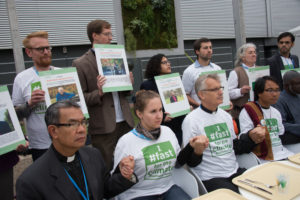As Christian communities kick off the “preparation” stage for the Season of Creation this month, faith leaders have announced a global day of action during the UN General Assembly in September for faith communities to endorse a Fossil Fuel Non-Proliferation Treaty.

The Season of Creation, an annual Christian celebration to pray and respond together to the cry of Creation, begins on September 1 on the Feast of Creation, and ends October 4, the Feast of Saint Francis of Assisi, the patron saint of ecology beloved by many Christian denominations. February marks the “preparation” stage for the Season of Creation, a key moment for followers to underscore their commitment to the call to care for our common home.
In addition to the global day of action, some of the outlined activities will also include a webinar in June to launch the Season of Creation Celebration Guide and a closing event on October 4.
“As Pope Francis said in Laudate Deum, ‘The necessary transition towards clean energy sources such as wind and solar energy, and the abandonment of fossil fuels, is not progressing at the necessary speed.’ (LD 55). Thus, People of faith worldwide are taking decisive action,” said Dr Lindlyn Moma, Director of Advocacy, Laudato Si’ Movement.
“September 21, during the 2024 Season of Creation, has been declared a Global Day of Action to join the Fossil Fuel Non-Proliferation Treaty. This symbolises our unwavering commitment to accelerating the transition away from fossil fuels, uniting in hope and action for a fossil fuel phase-out,” added Moma.
Faith institutions around the world, including Islamic Relief Worldwide, World Council of Churches, and Soka Gakkai International, are making the moral case for a Fossil Fuel Non-Proliferation Treaty, building momentum around the campaign. Ahead of COP27 in Egypt in 2022, more than 430 faith groups released an open letter calling on governments to develop and implement a Fossil Fuel Non-Proliferation Treaty. The Dalai Lama has also voiced support for a Treaty proposal, and Cardinal Michael Czerny, a top ranking official from the Vatican, has also said that “All new exploration and production of coal, oil, and gas must immediately end, and existing production of fossil fuels must be urgently phased out.”
In addition to faith groups, around the world, a growing bloc of 12 nations – Vanuatu, Tuvalu, Tonga, Fiji, Niue, the Solomon Islands, Antigua and Barbuda, Timor-Leste, Palau, Colombia, Samoa and Nauru – have endorsed this initiative. The Treaty is also supported by the World Health Organization, the European Parliament, nine Peruvian Indigenous Nations, 2,500+ civil society organizations, and over half a million individuals, including Nobel Laureates, 3,000 leading academics, scientists, hundreds of Indigenous, health, and youth groups, celebrities and influencers who understand the imperative of this crucial crusade.
“Faith leaders around the world understand the existential threat that planet-heating fossil fuels pose to communities,” said Harjeet Singh, Global Engagement Director at the Fossil Fuel Non-Proliferation Treaty Initiative. “Neglect, exploitation, and unsustainable consumption – which are exemplified by fossil fuel extraction and expansion – threaten the natural balance, social harmony, and existence of life on earth. This is why religious and spiritual communities are calling for urgent and equitable action from governments to protect all life on earth.”
Findings from the United Nations Environment Programme indicate that governments are planning to expand fossil fuel production at double the amount that would be consistent with keeping within 1.5 degrees Celsius of warming, the temperature threshold agreed upon by the international scientific community. This conflicts with national government commitments under the Paris Agreement, but despite this threat, there is no mechanism in place to limit fossil fuel expansion.
A Treaty would provide the missing framework for coordinating a global wind down of oil, gas and coal production and fair energy and economic transition where countries with the greatest financial and institutional capacity such as the United States, UK, Norway and Canada lead and support nations with greater dependence on fossil fuels to shift away from fossil fuels.
